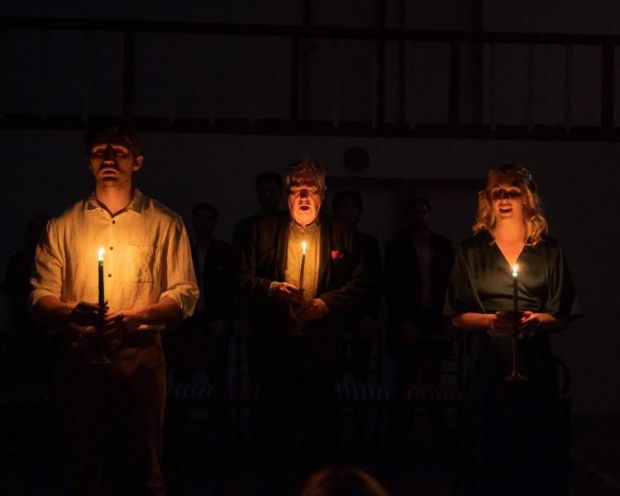‘Tis Pity She’s a Whore
A blood-drenched Jacobean revenge tragedy, written nearly 400 years ago, says more about our contemporary world than we probably care to admit.
Playwright John Ford was a contemporary of Shakespeare’s, but while Romeo and Juliet’s family feud provided a killing field, Ford’s add on to star-crossed love, the abiding taboo of incest, inspires a huge, bloody 17th century massacre, even in this tightly edited, reduced cast version.
As men set the gender agenda, then blame-shame women when it all goes awry, post Roe v Wade America, Iran’s morality police and Domestic Violence reverberate across four centuries onto the stage driving the ultimate bloodbath.

Theatre like this production by new indie theatre ‘The Company’ - raw and unpretentious, no artifice, minimal settings, just actors and creatives putting it out there – is engaging. The theatre, too, is raw, a warehouse / studio space, with lots of useful entrances, exits and levels, like the many improvised theatre spaces which use to pop-up all over Sydney, long before we labelled anything pop-up. The staging, too, is basic. A carpet square, chairs moved inconspicuously, a sideboard, simple hand props and later, a banquet table on which the final tragic consequences will be laid out. Period ambiguity of costuming on this relatively neutral setting hints at universality.
Annabella is desired by every young man in the play, including her brother Giovanni. Olivia Hall-Smith gives us a radiant, engaging tragic hero – vivacious, charming, passionate and somewhat naïve. She makes us care, providing the driving heart of the production, her attraction is the truly credible force needed to make this drama work. Claudia Shnier provides close, caring support as her confidante, Putana.

By contrast, her suitors all come across as self-obsessed peacocks – doubling as fighting cocks, competing for the prize. Bayley Prendergast’s superficial Giovanni won’t take no for an answer as he pushes his sister Annabella’s boundaries incestuously for more than the strong sibling affection she initially feels. Prendergast’s Giovanni comes across as a rash, shallow selfish boy-man with no regard for consequences, fiercely resisting any advice from his mentor, the Friar (Maeliosa Stafford, in a controlled, physically rigid portrayal, mirroring the ‘pious’ internal character).
Ugliness simmers beneath a façade of charm and dark charisma in Arkia Ashraf’s strutting, egotistical Soranzo. We learn this early on, and not from subtext – we know he’s previously disposed of another man to bed his wife (Isabella Williams’ passionate, fiery Hippolita, now hell-bent on revenge) - but has subsequently dumped her to pursue Annabella. Williams’s performance at the wedding is a comic highlight before the storm.
Other apparent rivals for Annabella’s hand prove inept - one misses his target, stabbing another – so the field is seemingly left clear for the Friar and Annabella’s father Florio (played credibly by Martin Portus, utterly bemused as his world quickly crumbles) to arrange a wedding with an unwitting Soranzo before the pregnancy becomes obvious. After the nuptials, though, Annabell makes no secret of her condition.
Soranzo’s brooding presence at the wedding feast, ‘cuckolded’ pre-marriage, forbodes the ugly end to come.
Blood flows – with the audience no more than three rows from the action, it’s effective and graphic. Yet when it’s time for justice to be meted out, the patriarchy (in the form of the Cardinal, played by Mark Barry) has escape clauses for male killers - one because he’s a war hero, the other an obsequious, duplicitous scheming servant (Clay Crighton), who has killed two women in the interests of master Soranzo - suffering no fate worse than exile.

It's worth a mention that Crighton skillfully doubles as roving violinist, setting the moment, accompanying action, and often adding musical commentary. It’s a splendid touch.
The play and its world finally spiral out of control, with just two religious patriarchs left standing amidst the bloodbath, in denial to the very end.
When the Cardinal speaks the play’s title in his closing speech, its delivery is ultra-creepy, vile in context, and speaks to the sinister truths of so many male-dominated societies and institutions, then and now.
Cancel culture might well have had a strong case against this old play, were it not for the decisive directorial voice and choices, and satirical edge in this production. Congratulations to young co-directors and co-producers Harry Reid and Talia Benatar on this terrific, unflinching first production from ‘The Company’.
And damn, they do the blood, the disgorged eyes, the foaming-at-the mouth poisoning and dramatic heart attacks impressively. All worthy of a Stephen King film, it’s such a vital element of any Jacobean Revenge Tragedy.
Neil Litchfield
Subscribe to our E-Newsletter, buy our latest print edition or find a Performing Arts book at Book Nook.

